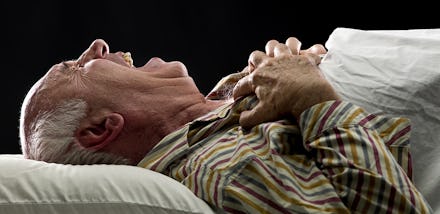Do You Hear Cannon Fire Before Bed? It Might be Exploding Head Syndrome

If you hear shotgun blasts, cymbal crashes or cartoony dynamite booms as you try to fall asleep, you might be a Looney Tunes character, or you might have exploding head syndrome.
And yes, it's actually called exploding head syndrome, and it's more common that you might realize.
Contrary to what sounds like a dangerous, incendiary bio-attack, exploding head syndrome, first coined in the late 1980s by neurologist J.M.S. Pearce, doesn't actually cause any pain. EHS is just sound — a loud, disruptive, often terrifying sound.
"People hear it differently, but it's most commonly experienced as an explosion, gunshot or big thud," Brian Sharpless, the lead author of a recent study on EHS, told Mic. "Some people hear screams or thunder."
In rare cases, people see flashes of light or visual static. But when they wake up scared and confused, Sharpless says, they're met by a calm, not air-raided room.
How it happens: "At the biological level there's a part of your brain called the reticular formation," Sharpless told Mic. "This helps shut you down when you're going to sleep. But instead of shutting down your auditory neurons, it actually causes them all to fire at once. It's almost a hiccup, and it does the wrong thing. That's why we think you get this loud, nonspecific sound — people, voices or music. It's always a very quick, loud noise."
Early evidence showed EHS was an affliction of old age, a fairly rare phenomenon growing more common in people over 50. But according to Sharpless' study published in the Journal of Sleep Research, almost a fifth of the study's 211 undergraduate test subjects experienced the syndrome. Sharpless found that 18% of his subjects had had at least one experience with EHS, and that number only dropped to 16.6% for students with recurrent cases.
Still, over one in 10 is a high rate, all things considered, and in rare cases, subjects experienced such brutal EHS that their heart rates spiked to levels matching clinically significant distress, most likely caused by, well, the fear someone was actually firing shotgun shells into their brains.
So why is this happening? Unfortunately, the reasons some subjects suffer more than others are hard to pick out. "I think psychological factors like stress and behavioral factors like not getting good sleep or having disruptive sleep make it possible," Sharpless told Mic.
The medications Sharpless found to help prevent episodes include a tricyclic antidepressant called clomipramine and a medication to prevent seizures, which, bafflingly, only decreased the volume of the explosions. Otherwise, treatment literature on the matter runs a little thin and prevention methods are few and far between.
Considering exploding head syndrome's potential to totally ruin someone with pre-sleep warfare hallucinations, Sharpless plans to continue testing to find out what might make EHS cases more prevalent, and in whom.